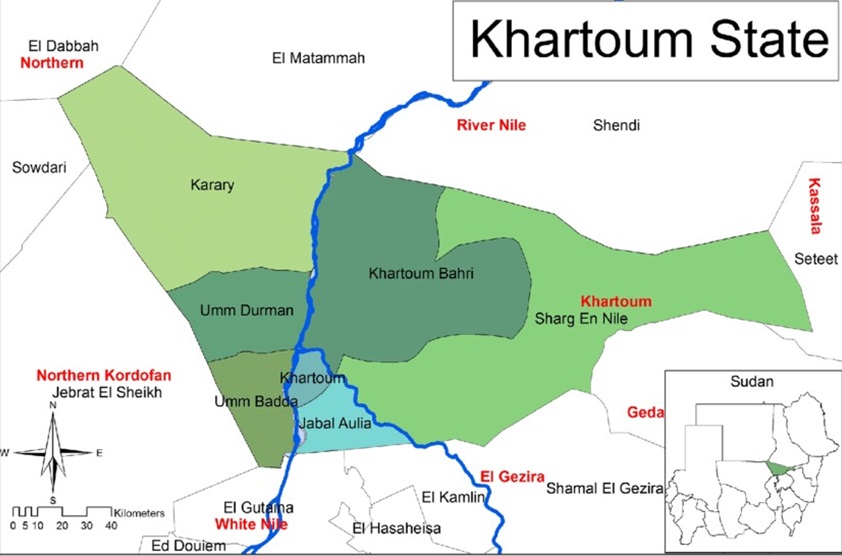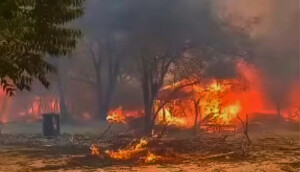At least 12 killed in intensified battles in Sudan capital, almost all charity kitchens closed

Fighting between the Sudanese Armed Forces (SAF) and the Rapid Support Forces (RSF) escalated again in greater Khartoum last week. Especially Omdurman witnessed fierce clashes. In southern Khartoum, seven people were fatally hit by shells on Thursday. Four people were killed in a drone attack on a market in Khartoum North. About 90 per cent of the charity kitchens in Khartoum state’s three cities have been closed.
Speaking to Dabanga on Friday, Mohamed Kandasha, spokesperson for the emergency committee of Khartoum’s Southern Belt, reported that seven people, three men, three women, and a child, were killed by artillery shells in the En Nahda neighbourhood in southern Khartoum the previous day. Two people were wounded. They were transferred to the Bashair Hospital and the El Ragi Hospital.
More than 30 people were injured in a drone attack on Market 13 in El Haj Yousef in Khartoum North on Wednesday. “Four of them succumbed to their wounds early the next morning. The others are being treated in the Alban Jadeed Hospital,” Wael Abdelrahim, member of the El Haj Yousef Resistance Committees, told Dabanga.
The emir of the El Baraa bin Malik El Moez Talha paramilitary battalion fighting along the SAF announced the death of one of their fighters in battles with the RSF in El Mohandesin in Omdurman on Thursday.
After more than 300 days of SAF-RSF battles, the situation for people still living in Khartoum state worsened rapidly last week, as SAF and RSF troops clashed in the neighbourhoods of old Omdurman and the Engineers Corps in El Mohandesin. Fierce battles also took place in the Omdurman Market area, the El Shaabi Market and the El Arda Street.
The army announced the lifting of the RSF siege on the Engineers Corps and the linking of its forces at the Karari military area with the Engineers Corps across Omdurman on Thursday, while members of the RSF posted footage of their soldiers, claiming they succeeded to separate the army units again and regained control of El Arda Street.
In Khartoum, fighting continued in the Southern Belt*, the Armoured Corps in El Shajara, and the SAF General Command in central Khartoum.
Clashes were also reported near the Signal Corps in Khartoum North (Khartoum Bahri). In the Hattab neighbourhood, army forces attacked RSF positions with drones, sources told Dabanga. The RSF pushed new reinforcements to the old Bahri area and continued its shelling of the Signal Corps near Kober.
High prices and food scarcity
The escalating fighting led to a further decrease in consumer commodities and fuel. Shops that were still open, closed their doors. The three-week long communications blackout also contributed to the rise in prices.
The transportation tariffs witnessed huge increases. A bus ticket for transport within Khartoum rose from SDG3,000 to SDG6,000 last week, while a ticket from Khartoum to Wad Madani in El Gezira or to Kosti in White Nile state now costs SDG60,000.
The severe shortages of fuel and cooking gas have also affected the food kitchens set up by activists in various neighbourhoods in Khartoum state.
Wael Abdelrahim, member of the El Haj Yousef Resistance Committees and coordinator of the Khartoum State Services Office, told Dabanga that 90 per cent of the neighbourhood-based emergency rooms in Khartoum state have now stopped distributing food.
“The emergency rooms in Khartoum state have been preparing food through takaya [poorhouses, charity kitchens] to thousands of people since the war broke out in April last year. The kitchens served 41,900 people in Khartoum locality, and 1,065 in Jebel Aulia. In Khartoum North, the kitchens distributed food to 135,000 people in Sharg El Nil (East Nile) and to 38,865 people in Bahri locality. In Omdurman locality, we served 4,855 and in Ombadda 7,550,” the activist reported.
“In addition to the communications networks outages and the scarcity of cooking gas, we also had difficulties with finding and transporting the food and the lack of funding,” he explained. “There is a great shortage of food supplies and the latest price increases exceeded 300 per cent.”
The United Nations World Food Programme (WFP) warned last week that the vast majority of Sudanese face severe hunger, with more than five million people living on less than one adequate meal per day.
* Khartoum’s Southern Belt is part of the periphery of the capital inhabited by people earlier displaced by wars in Darfur, Kordofan, and Blue Nile region and South Sudanese refugees, and by impoverished farmers from various parts of the country who lost their lands to banks when they could not pay their debts anymore.











 and then
and then